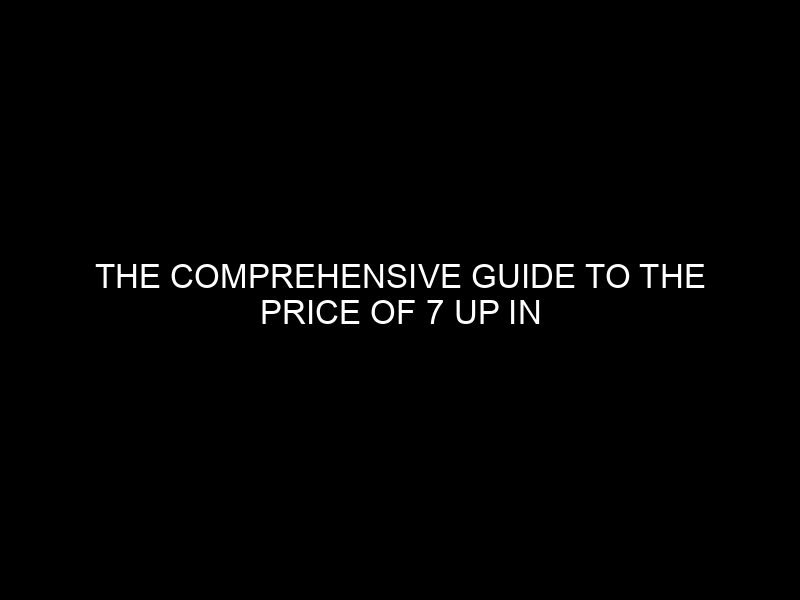7 Up, a popular carbonated soft drink, has been a household name in Nigeria for decades. Known for its crisp, refreshing taste, 7 Up has established itself as a leading beverage choice among Nigerians. Understanding the pricing of 7 Up in Nigeria is crucial for consumers, retailers, and investors alike, as it reflects not only market trends but also economic factors specific to the country.
As an expert with extensive experience in Nigeria’s business sector and a deep understanding of 7 Up’s market positioning, I am well-equipped to provide comprehensive insights into the pricing dynamics of 7 Up in Nigeria.
Detailed Insights into 7 Up Pricing
Factors Influencing 7 Up Prices
The price of 7 Up in Nigeria is influenced by various factors including production costs, distribution expenses, and market demand. Importantly, fluctuations in the Nigerian economy, such as changes in the Naira’s value and inflation rates, significantly impact these costs. Additionally, regulatory policies and competition in the soft drink market play a crucial role.
Production and Distribution Costs
The cost of producing 7 Up involves raw material expenses (like sugar, flavorings, and water), packaging, and manufacturing overheads. Nigeria’s infrastructure and logistical capabilities also affect distribution costs, influencing the final retail price.
Economic Fluctuations
Economic variables such as inflation, exchange rates, and taxation directly affect the price. For instance, an increase in sugar tax or a depreciation of the Naira against the dollar can lead to a rise in the price of 7 Up.
Competitive Landscape
The presence of competitors like Coca-Cola and Pepsi, and local brands, creates a competitive pricing environment. 7 Up, being a product of the Seven-Up Bottling Company, often adjusts its prices in response to these market dynamics.
Current Price Trends
As of my last market analysis, the price of a 500ml bottle of 7 Up in Nigeria ranged from NGN 100 to NGN 150, depending on the region and retail outlet. However, these prices are subject to change due to the aforementioned factors.
Price Variations Across Different Regions
Nigeria’s diverse economic landscape means that 7 Up prices can vary significantly across different regions. Urban areas like Lagos and Abuja might have higher prices due to greater operational costs and higher living standards, compared to rural areas.
Impact of Seasonal Demand
Seasonal trends also influence the price of 7 Up in Nigeria. During festive periods and hot seasons, demand increases, which can lead to a rise in prices.
Heading into the Future: Predictions and Trends
Looking forward, the price of 7 Up in Nigeria is likely to be influenced by global economic trends, changes in consumer preferences, and advancements in production technology. Sustainable practices and health trends could also impact production costs and, subsequently, prices.
FAQs
Q1: Why does 7 Up cost more in some Nigerian regions than others?
A1: The price difference is mainly due to variations in transportation costs, operational expenses, and market demand across different regions.
Q2: How does the Nigerian economy affect the price of 7 Up?
A2: Economic factors like inflation, exchange rates, and taxation directly impact production and distribution costs, thereby influencing the retail price of 7 Up.
Q3: Are there seasonal fluctuations in the price of 7 Up?
A3: Yes, prices may increase during periods of high demand, such as festive seasons and hot weather months.
Q4: How does competition affect 7 Up’s pricing strategy?
A4: The presence of other soft drink brands leads to competitive pricing. 7 Up must balance maintaining market share with profitability, influencing its pricing decisions.
Q5: Can we expect a change in 7 Up prices in the near future?
A5: Prices may change due to factors like economic shifts, changes in consumer preferences, and advancements in production technology.
Conclusion
Understanding the price of 7 Up in Nigeria involves a multifaceted
approach considering various economic, logistical, and market factors. As a beverage deeply rooted in Nigerian culture and everyday life, its pricing not only affects consumer choices but also reflects broader economic trends within the country.

Leave a Reply